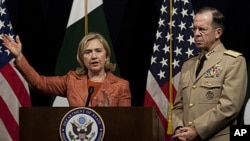U.S. Secretary of State Hillary Clinton and the chairman of the U.S. Joint Chiefs of Staff, Admiral Mike Mullen, have made an unannounced visit to Pakistan to meet with government and military leaders. Clinton says U.S.-Pakistani relations are at a turning point following the raid that killed Osama bin Laden in Pakistan, but that no one in Washington believes Pakistani leaders knew where the al-Qaida leader was hiding.
Speaking after their meetings, both Admiral Mullen and Secretary Clinton stressed that the U.S.-Pakistani partnership must move past the bin Laden raid to continue and intensify the fight against extremists in the region.
Clinton and Mullen flew to Pakistan on short notice for meetings with President Asif Ali Zardari, Prime Minister Yousuf Raza Gilani and Pakistan's military leadership, including the head of military intelligence.
At a news conference, Mullen acknowledged the raid that killed bin Laden caused diplomatic difficulties, and he stressed that closer cooperation is needed.
"Now is not the time for retreat or for recrimination," he said. "Now is the time for action and closer coordination. For more cooperation, not less. For the friendship to get stronger, not weaker."
The secretary of state and the top U.S. military officer both said their talks with the Pakistanis were frank and productive, covering increased cooperation in the war against terrorism and extremists, both in Afghanistan and the Pakistani frontier region.
Without referring to suggestions by some in the U.S. Congress of withholding some of the $2.7 billion the United States gives Pakistan each year in security-related aid, Secretary Clinton said the U.S. and Pakistan will continue that important fight as allies:
"We will do our part and we look to the government of Pakistan to take decisive steps in the days ahead," she said. "Joint action against al-Qaida and its affiliates will make Pakistan, America and the world more secure."
Clinton said public misunderstanding and confusion risks undermining real cooperation between the two countries. She cited both growing anti-Americanism in Pakistan and public mistrust of Pakistan in the United States. Answering a Pakistani reporter's question, she said the two nations can move forward only through real transparency:
"Let’s clear away the underbrush. Let’s have the kind of open, candid conversation that you and I are having now, and that we had earlier today. And then let the chips fall where they may. But let’s not be misinterpreting and misrepresenting each other, because then we can never, ever find common ground," Clinton said.
Since bin Laden had been hiding deep inside Pakistan, there has been widespread skepticism in the West about where Pakistan stands in the war on terrorism.
But Clinton said even if someone in Pakistan knew the al-Qaida leader was here, or perhaps even gave him shelter, there is no evidence that leaders in Islamabad knew the fugitive terrorist chief was living just two hours away from the capital.
"There is absolutely no evidence that anyone at the highest levels of the Pakistani government knew he was living just miles from where we are today," she said.
The secretary of state confirmed that U.S. authorities have now been given access to the compound in Abbottabad where bin Laden lived secretly for years, and where he ultimately met his end.
Admiral Mullen and Secretary Clinton said they also discussed with the Pakistanis the need to bring the war in Afghanistan to an end.
Clinton said there is a need for reconciliation with enemy groups that can be brought into the political process in Afghanistan, but that some irreconcilable elements will have to be captured or killed.
She and Mullen also stressed that positive, proactive involvement by Pakistan will be essential to end the Afghan war and regional instability in the near future.




